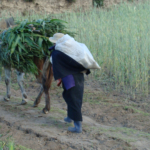


Regents of the University of Michigan
Peru
5/2019—5/2021
Diversifying farming systems holds potential to sustainably enhance the productivity and profitability of smallholder agriculture in low- and middle-income countries. A variety of ecosystem services is supported by these systems, and they have positive impacts on resource use efficiency and pest regulation. Agrobiodiversity may also play a critical role in nutrition, as well as in nutritional resilience. That is, agrobiodiversity may enhance the ability to respond to and rebound from the negative nutritional consequences of economic and climatic shocks. This potentially contributes to transformations toward sustainability and social justice of the agri-food systems of smallholder farmers. That said, surprisingly little attention has been paid to the potential linkages between agrobiodiversity and human diets. Research has examined small-scale home gardens or production of staple crops biofortified with essential micronutrients. Yet, in many cases, these studies have been hampered by research design flaws, have often not adequately measured nutrition-related outcomes, or have not taken a holistic view of farm-level agrobiodiversity that may have important implications for diets. Furthermore, though many studies have suggested that agrobiodiversity may be beneficial for the diets of smallholder producers, few have actually been able to provide rigorous evidence beyond cross-sectional data that could influence research and policy agendas. This dearth of longitudinal analysis has also meant that few studies have been able to examine the dynamics of if and how agrobiodiversity contributes to nutritional resilience over time. There is an urgency to understand the transformative potential of agrobiodiversity both to impact diets, and to contribute to nutritional resilience more broadly. The resilience functions of agrobiodiversity (including its limitations) may have important implications for diets and nutrition, as well as for multiple environmental, social and health-related outcomes. This research seeks to address key knowledge gaps in understanding and strengthening this resilience and its contributions to transformations that promote environmental sustainability and healthy diets.
This project will provide a longitudinal examination of the relationship between agrobiodiversity and diet quality, thus offering the unique opportunity to understand trends, transitions, and feedbacks related to changes in the relationship between agrobiodiversity and diets—a relationship that has been studied almost exclusively using cross-sectional research designs to date.
The overall goal of the project is explore the relationship among agrobiodiversity, nutrition and resilience in the Huánuco region of Peru.
